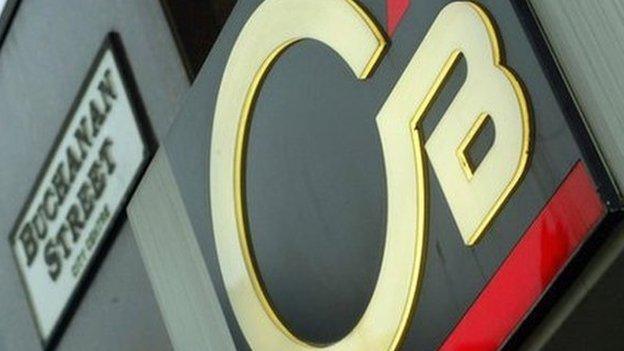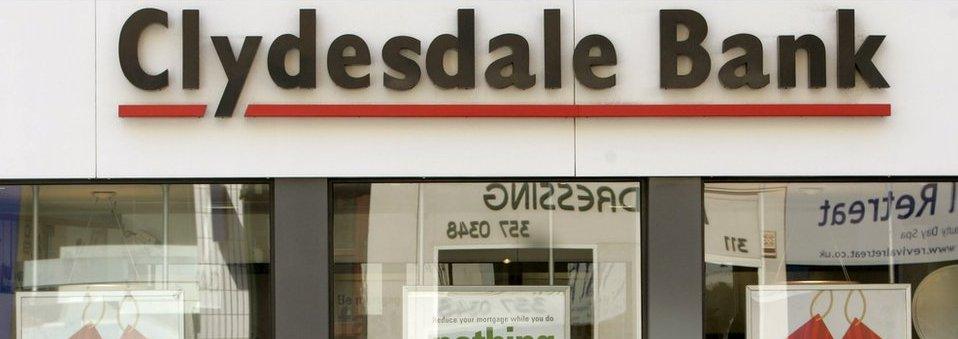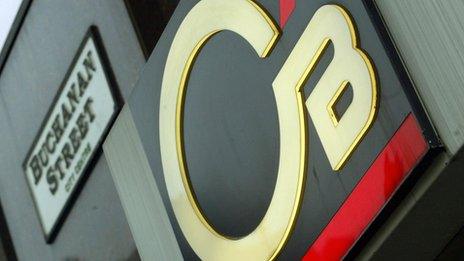Clydesdale delays share trading
- Published

The £1.6bn flotation of the Clydesdale Bank was postponed on Tuesday for 24 hours.
The delay in the Initial Public Offering (IPO) followed a "specific request" for information from an unnamed ratings agency.
The agency wanted financial information relating to its assessment of Clydesdale Bank's deposit rating.
The Glasgow-based lender, which includes Yorkshire Bank, is being spun out of National Australia Bank (NAB).
Most of the demerged bank will be owned by NAB shareholders, but 25% of the stock is being sold to institutional investors.
Shares are expected to be traded on the London Stock Exchange under the new name CYBG, following what the company said was "a very short delay".
On Tuesday evening, the bank confirmed the IPO share price at 180p, valuing it at £1.58bn.
Chief executive David Duffy said: "This is truly a landmark day for CYBG as we move towards becoming an independent banking group for the first time in almost a century and we are delighted to be listing on both the London Stock Exchange and the Australian Securities Exchange.
"CYBG is in great shape to begin this exciting new chapter.
"With the IPO process successfully behind us, all of our energy will be dedicated to delivering industry leading service for our customers and improved and sustainable returns for our new and future shareholders from around the world."

Douglas Fraser, BBC Scotland business and economy editor
It's been a rocky road towards the creation of the new, independent Clydesdale Bank, or CYBG as it is to be known to investors.
And with markets very volatile, this was a risky time to float. A last-minute glitch doesn't help.
A statement this morning from National Australia Bank said there is healthy demand for shares at 180p - towards the lower end of the range previously announced.
But some institutional investors cannot commit until they are confident about CYBG's credit ratings.
The new standalone bank expects to have an overall rating at investment grade, which is important for its ability to raise funds on the money markets.
But banks have different ratings on many of their financial instruments.
And another CYBG rating - by an unnamed big agency, and reflecting the position of short and long deposits - is being delayed until more information is provided.
Those financial instruments involve an eighth of the Clydesdale's funding. And there is a risk of a downgrade or a "negative watch", in which case investors may back off.
Big funds are constrained by the extent of risk exposure they have promised their investors. And a downgraded rating on CYBG deposits could mean they have no choice but to avoid investing in its shares.
A downgrade may not occur, points out NAB. And if it does, it may not have much impact on the bank overall. But it has to acknowledge that risk.

Three-quarters of the shares are being distributed to NAB shareholders, and also traded on the main Australian stock market.
The other quarter has been offered to institutional investors, and after a week of "conditional trading" between City of London investors, they will be fully tradable from 8 February.
NAB has been trying to offload its only European subsidiary for several years, under pressure in Australia, where a British bank is seen as a burden.
The parent company has been unable to find another bank to take on the Clydesdale as a subsidiary. It took heavy losses on poor property loans and mis-selling charges to prepare the British lender for flotation.

Clydesdale Bank, with Yorkshire Bank - facts and figures

Founded: 1838
Headquarters: St Vincent Place, Glasgow
Customers: 2.8m
Branches: Scotland 121 England 154
Business Centres: 40
Staff: 7200, of which 3100 in Scotland
Total assets: £39bn
Customer loans: £28bn
Mortgages: £19.6bn
Business loans: £7.3bn
Key measure of tier 1 capital: 13.3%

Clydesdale Bank did not feature amid the near-collapse of other British banks in 2008. Its problems came to light later.
Having been hit by poor quality lending, its managers have sought to simplify its activities into retail accounts and mortgages, and they are focusing also on small and medium-scale businesses.
Approval for the de-merger came from NAB shareholders last week, and the Supreme Court of Victoria state on Monday morning. NAB chief executive, Andrew Thorburn, issued a statement welcoming the creation of two corporate entities:
"The demerger allows each business to focus on improving performance in their home markets and on business priorities that will maximise value for their respective shareholders.
"NAB is now in a position to focus all its resources, attention and leadership on the markets most important for us - Australia and New Zealand."
Volatile stock markets around the world have made this a risky time to float shares. Last week, the Chancellor, George Osborne, postponed plans for sales of the government's stake in Lloyds Banking Group, until markets stabilise.
Another bank that sees itself as a challenger to the big high street lenders, Metro Bank, launched in 2010, has announced plans to float in coming weeks.
- Published15 January 2016
